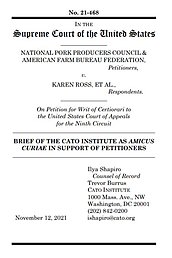Learn more about Cato’s Amicus Briefs Program.
In 2018, California voters approved Proposition 12, a far-reaching law designed “to prevent animal cruelty by phasing out extreme methods of farm animal confinement.” The law requires that all pork, veal, and eggs sold in the state comply with new restrictions on how the animals can be confined. That means that pork producers in other states will have to comply with California law if they want to sell there.
In the wake of the law, many suits were filed by various agricultural entities arguing that California law was unconstitutionally crossing state borders and regulating interstate agricultural markets. This is especially true for the pork industry, which has very little presence in California—only about 0.2 percent of the country’s breeding sows are in the state. The pork industry is a highly integrated interstate market where a pig farmer in North Carolina might sell his stock to a meatpacker in Illinois, who then distributes to California. It’s very difficult to trace a given cut of meat back to its source and verify that the farmer complied with California law.
Because the Constitution gives Congress power over interstate commerce it is possible for state laws to encroach on Congress’s power and to regulate extra-territorially. This is called the “dormant” Commerce Clause, and it has long been controversial and conceptually difficult. Nevertheless, the National Pork Producers Council is bringing that argument to the Supreme Court, which is being asked to take the case.
Cato has filed a brief in support of the National Pork Producers Council that tries to bring some clarity to the dormant Commerce Clause. Many state laws affect or burden activities in other states—especially for California due to the size of its economy—but every law that burdens interstate commerce is not unconstitutional. But, we argue, due to the interstate nature of the pork industry and the unique burdens of Prop 12, the Court should take a special look at this case.
Prop 12 will have California agricultural agents travelling around the country to ensure that farmers in other states comply with California law. It will raise the price of pork around the country, possibly significantly. This will all happen because about 7.5 million Californians voted for Prop 12. Yet one of the reasons the Constitution gives Congress power over interstate commerce is because Congress has nationwide representation and therefore is better situated to weigh the costs and benefits of nationwide policies.
While laws that attempt to limit animal cruelty are often admirable, the question in this case is not about the wisdom of the law, but its scope. Californians are free to regulate their own states’ agricultural products—and they certainly do—but they are limited in how much they can affect the policies of the whole country. The Supreme Court should look hard at this case and see whether Prop 12 unconstitutionally reaches too far.

This work is licensed under a Creative Commons Attribution-NonCommercial-ShareAlike 4.0 International License.


